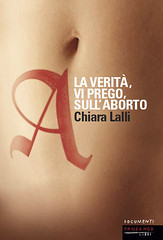Eugenia Roccella torna all’attacco contro uno dei suoi bersagli preferiti, la pillola abortiva, su Avvenire di oggi («C’è una pillola killer che non viene spiegata», 31 ottobre 2007, p. 2):
Nessuna trasmissione televisiva ha spiegato che l’aborto chimico è una procedura che richiede almeno 15 giorni, il cui esito è incerto fino alla fine, che avviene in solitudine, tra nausee e crampi dolorosi (è, in sostanza, un piccolo parto), che costringe la donna a controllare continuamente il flusso emorragico e quindi a vedere, nella maggioranza dei casi, l’embrione abortito.L’articolo del Times di cui parla la Roccella è stato firmato da India Knight («Brutal truth of DIY abortion», The Sunday Times, 14 ottobre), e il suo obiettivo polemico è la possibilità, che le autorità britanniche stanno considerando, di consentire l’assunzione a casa della paziente della seconda delle due compresse che propriamente costituiscono la «pillola abortiva»; gli argomenti sono più o meno gli stessi della Roccella: la solitudine e la possibilità di vedere il concepito (la Knight specifica anche di essere personalmente contraria all’aborto).
Chi crede che la Ru486 sia un metodo sicuro e indolore dovrebbe leggere la stampa straniera: scoprirebbe così che il «New York Times» ha ampiamente informato sulle morti e gli eventi avversi provocati dal farmaco, mentre l’inglese «Times», solo 15 giorni fa, ha pubblicato un articolo dal titolo significativo: «La brutale verità sull’aborto chimico», in cui ha definito la Ru486 «horror-pill».
La risposta migliore, credo, l’hanno data i molti commentatori – in gran parte donne – che nell’edizione online del Times hanno detto cosa pensano dell’articolo della Knight. Molte di loro hanno sperimentato in prima persona ciò di cui si parla; riporto qui le testimonianze più significative.
Women already take the abortion pill at home. I did. There is quite a bit of pain involved – like very bad period cramps. I’m glad I could have it at home, was easier to deal with as I could roll around on my bed and get a hot water bottle – easy access to bathroom etc... Practically it would have been more uncomfortable at hospital, however would have been comforting to have nurses/doctors nearby, and to meet other women going through the same experience. As for the foetus going down the pan – well that would happen at hospital as well and I think if you’ve decided to have an abortion you realise that you are expelling a foetus and that fact cannot be changed wherever you have it.Ci sono prospettive diverse in altre risposte, naturalmente; ma si tratta appunto di lasciare a ciascuno «il diritto di fare le proprie scelte».
This type of abortion is known as an early medical and given at less than 8 weeks – the foetus is the size of a grain of rice. What can be seen in the toilet is the amniotic sac (a small lump) – not the foetus.
Sophie, London, UK
As for home vs hospital, in the absence of medical risk I will take my home any day of the week, along with its privacy, its cleanliness and its freedom from judgemental staff and patients.
Gayle Ronald, Birmingham, UK
Having had three miscarriages, I can honestly say that the two that occurred at home had less trauma attached to them than the one in hospital. The emotional impact is reduced where more normalcy prevails. I am pretty sure that if I had to make the choice, I would prefer to take the abortion pill in the comfort of my own home.
Mary Stanley, Chester, England
What makes you think an abortion in hospital is less traumatic than an abortion in the privacy and quiet of your own home, potentially with a partner, girlfriend, sister or significant other holding your hand rather than a disinterested nurse?
My wife recently had a miscarriage. And believe me, the experience would have been less traumatic for both of us if we hadn’t had to go to hospital.
Malcolm, London, UK
If I had to take that pill, I’d rather take it at home, be able to sort out my homelife and appreciate what I have, to not have to stay out all day and explain it all, and to go through something difficult in the safety of my home and the bosom of my family. I’m not at all sure why, just because you can’t cope with the realities of it ACTUALLY being part of your real life, you feel that the rest of us should be denied a practical, convenient, and reassuring way of dealing with a bad experience.
This is how I, as a woman, would rather deal with it. You, as a woman, should at least give me the respect of acknowledging my right to make my own choices.
Sian Evans, Hawick


























Nessun commento:
Posta un commento